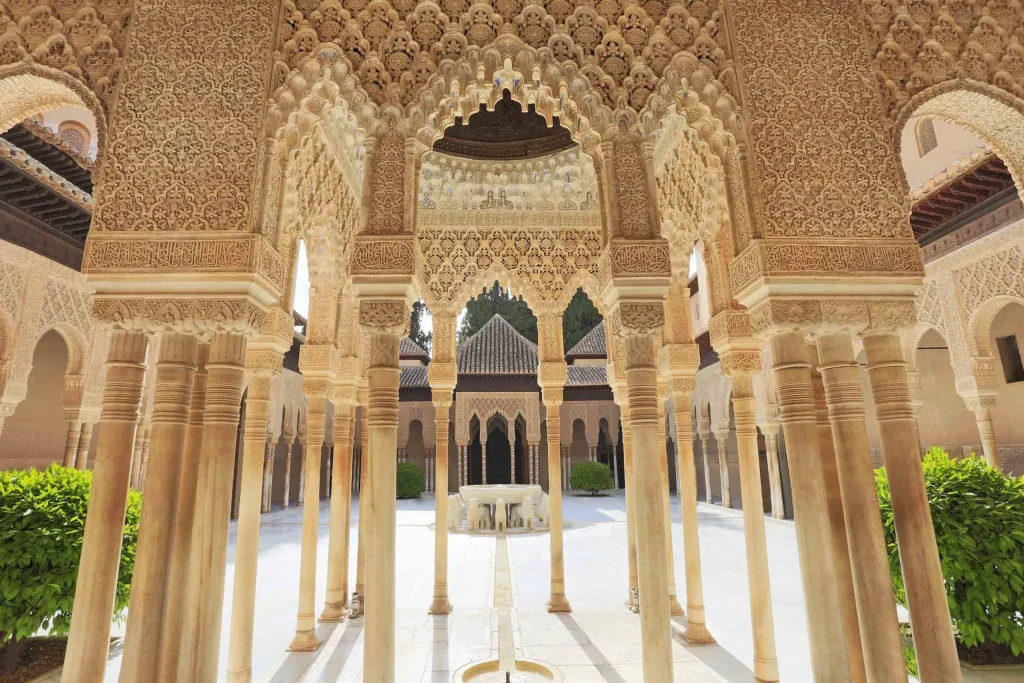Islamic Tolerance in AL-Andalus
By: Habeeb Salloum/Arab America Contributing Writer

“Let there be no violence in religion”, and “Fight against the unbelievers until they cease persecuting you, but if they desist, then let there be no hostility.” These Qur’anic words were taken to heart when the Arab-Muslims occupied the Iberian Peninsula and formed their state which they called al-Andalus. The tolerance they showed their former enemies had little equal in the history of conquerors.
No more than 10,000 strong, the first Muslims who made Spain their home never felt that the other monotheistic religions were mortal enemies. They considered the Jews and Christians as ‘People of the Book’ and to have the same message as Muslims. Instead of unity based on one religion, they built a society where all religious faiths shared a common life.
Al-Andalus became a remarkable country for its age – a land of peaceful coexistence and harmony. The Christians and Jews were allowed to pursue their religions, subject to certain taxes as laid down in the Qur’an – no one was forced to convert. This allowed for a remarkable accommodation between all the faiths, producing a society which became progressive and evolving.
The tolerance of the Muslims, nurtured by the spirit of Islam, turned al-Andalus into the top cultural center on European soil. In the ensuing centuries, it became a bridge between the Islamic East and the Christian West, bringing all the accumulated knowledge of mankind up to that period into the emerging nations of Christendom, setting them off on the road to progress.

Arabic became the mark of culture for Muslims and non-Muslims alike and the most unifying factor for all the peoples of the Iberian Peninsula. Anwar Chejne in his excellent book, Muslim Spain, writes that Christians and Jews entered the mainstream of Muslim society and were eventually Arabized to a degree that they no longer were distinct from the Muslims.
The Arab-Muslims, as a whole, had little hatred for the other religions and always tried to bring down the barrier between them. Ameríco Castro indicates in The Spaniards that some of the Moors in Granada believed that the ‘Lord’s Prayer’ appeared in one of the ḥadīths (sayings of the Prophet) as an Islamic prayer.
Through the centuries, many important positions, including the highest offices under Muslim rulers, were held by Christians and Jews. In spite of the fact that in the remainder of Europe non-Christian faiths were, in the main, not accepted, the Muslims of al-Andalus remained faithful to a policy of scrupulous tolerance.
At times, this respect for other religions was sorely tested, like that which happened during the 9th century in Cordova. Some Christians found that it was almost impossible to maintain their religion in a country that offered no apparent persecution. Alvaro, a Christian theologian, is reputed to have complained that the Arabic language had become so alluring to young Christians that they could hardly write a letter in Latin, their own language. Rather, they reveled in the intricacies and beauty of the Arabic tongue.

The clergy, seeing that their flocks were becoming Arabized and many accepting the Islamic faith, tried to stop the conversions. Nuns and monks began to publicly blasphemize the Prophet Muhammad, but the Muslims never changed their policy of tolerance. Only the guilty were persecuted after the judges tried every method to have them recant their denunciations.
Due to the open society in the Iberian Peninsula, the Jewish Golden Age in literature developed under Muslim rule, especially between the 10th and 12th centuries. During this period, when Jews in the remainder of Europe were hardly tolerated, in al-Andalus, the Hebrew tongue developed its grammar and vocabulary on the model of the Arabic language. The uncommon openness of life in this medieval state gave a chance for a great number of Jews to become renowned literary men in both Arabic and Hebrew.
Discussing the unparalleled tolerance shown for Jews by the Spanish Arabs in the 10th century under the rule of Abd al-Rahman III, Elmer Bendiner in his book, The Rise and Fall of Paradise writes:
There was thus no pressure on Jews in tenth-century Andalusia to retire into a ghetto. There were no laws and scarcely any customs that confined Jews to any place or occupation. When their gates were shut, they were the ones who shut them.
At the same time, in the remainder of Europe, all life revolved around rigid Christianity. Truth within the Church could only be conceived by faith alone, as opposed to reason. That is, until Thomas Aquinas in the 13th century reconciled faith and reason. In this, he was greatly influenced by Muslim philosophers like Averroës whose works had been translated into Latin after the fall of Toledo in the 11th century.
In the subsequent years, the classical legacy, long outlawed by the Church, was made available through the translation of Arabic books. Along with Arab learning, developed throughout the Islamic world, the classical tradition was re-accepted by Christiandom, setting the West on the road to greatness.
The exceptional tolerance practiced by the Muslims in the Iberian Peninsula continued until al-Andalus began to be overwhelmed by the Christian states of the North. When refugees commenced to stream southward into Muslim controlled areas, religious tolerance began to give way to narrow-mindedness. The extraordinary tolerant medieval Islamic state of al-Andalus, which many Arab historians have called an ‘Earthly Paradise’, began to fade away.
Habeeb Salloum M.S.M.
REFERENCES
Bendiner, E. The Rise and Fall of Paradise. New York: G.P. Putnam’s Sons, 1983.
Burkhardt, T. The Moorish Culture in Spain. A. Jaffa (trans.). London: George Allen and Unwin Ltd., 1972.
Castro, A. The Spaniards. Los Angeles: University of California Press, 1971.
Chejne, A.G. Muslim Spain, Its History and Culture. Minneapolis: The University of Minnesota Press, 1974.
Dozy, R. Spanish Islam. London: Frank Cass, 1972.
Imamuddin, S.M. Some Aspects of the Socio-Economic and Cultural History of Muslim Spain. Leiden: E.J. Brill, 1965.
Read, J. The Moors in Spain and Portugal. London: Faber and Faber, 1974.
Sordo, E. Moorish Spain. Toronto: Ryerson Press, 1963.



